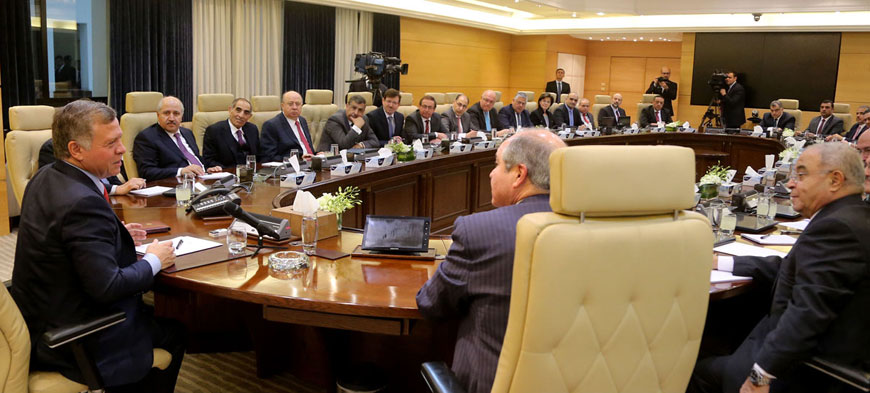AMMAN — His Majesty King Abdullah on Tuesday chaired part of the Cabinet session at the Prime Ministry where he instructed the government to improve the public administration and complete the electronic government programme by 2020, according to a Royal Court statement.
The King said reaching a "paperless government" has become a necessity and that "there was no justification or room for more delay in the matter".
He noted that every minister would be held accountable for implementing the programme in his or her own ministry, stressing that the provision of transparent and effective services to citizens is a key part in the government’s job description.
His Majesty urged the government, in cooperation with the Parliament, to accelerate the enactment of economic laws and to implement the ones recommended by the Royal Committee for Reforming the Judiciary and Enhancing the Rule of Law.
King Abdullah highlighted the importance of implementing a clear programme stimulating economic growth to meet the needs of all sectors and help achieve targeted growth rates, and enhancing job-generation capabilities.
The requirements to trigger further growth entail boosting efforts to implement already designed programmes as well as making necessary plans to support economic sectors in spite of the crippling regional situation, the King said.
As for the municipal and governorate council elections, His Majesty instructed the executive branch to keep its support of the Independent Election Commission, commending the prime minister and Cabinet members for their efforts towards that end so far.
For his part, Prime Minister Hani Mulki said His Majesty’s chairing of the Cabinet meeting was a great motivation for ministers to exert efforts to realise the envisioned reforms.
He said ongoing political reforms would reach a climax with the implementation of the Decentralisation Law, under which the governorate councils elections would be held in August, side by side with the municipal elections.
As for economic reforms, Mulki said the government is moving forward with plans, whose main feature is protecting the low- and middle-income segments.
He added that economic revival cannot be achieved only through tax reforms, stressing the need for effective efforts that ensure the private sector the necessary support to fully play its role in the process.
The prime minister highlighted the importance of boosting the tourism sector, which, he noted, saw positive results in the past two months. The government would also work to have in place online services at ministries, and, most importantly, plans to better manage public services, which, he said, has become plagued by favouritism and nepotism.
He further highlighted measures taken to improve the business environment as well as the judiciary sector.
ICT Minister Majd Shweikeh said the online transformation project “Digital Jordan” was inspired by His Majesty’s sixth Discussion Paper, which focused on the rule of law and accountability in public administration.
The government completed automating 125 services in 2015 and 2016, she said, stressing that the digitalisation process constitutes a key answer to the problems of red tape and favouritism.
His Majesty was accompanied by Royal Court Chief Fayez Tarawneh and King’s Office Director Jafar Hassan.
